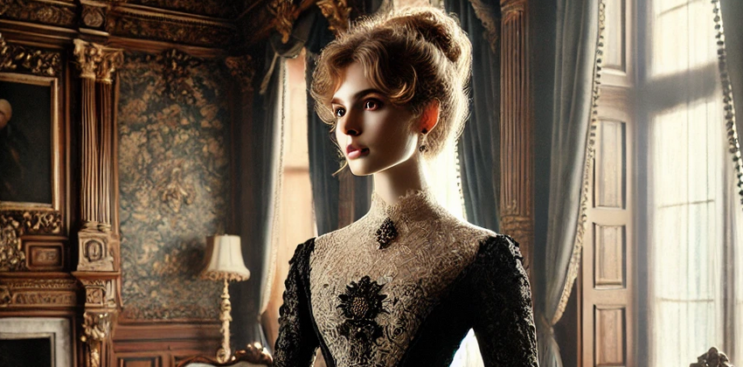“My Last Duchess” by Robert Browning is a dramatic monologue. In this poem, a duke speaks about his late wife, or “last duchess,” to a guest. The poem reveals the duke’s pride, jealousy, and control. Through his speech, we learn about his personality and the nature of his relationship with his late wife. The poem also explores themes like power, beauty, and possession.
The poem begins with the duke showing a portrait of his late wife. He describes her as “looking as if she were alive.” This phrase suggests that the portrait captures her beauty and liveliness. However, the duke’s words also hint at his cold and controlling nature. Instead of fondly remembering her, he speaks about her as if she were an object. The painting seems more valuable to him than her life.
The duke recalls how his wife was cheerful and kind to everyone. He says, “She had a heart—how shall I say?—too soon made glad.” This line suggests that she was friendly and found joy easily. However, the duke did not like this. He felt she should have reserved her smiles and joy only for him. Her friendly nature, instead of pleasing him, made him feel jealous. He saw her happiness as a lack of respect toward him.
The duke goes on to explain how his wife admired simple, everyday things. He mentions, “The dropping of the daylight in the West.” This line shows that the duchess enjoyed natural beauty. But the duke disliked this. He wanted her to focus on him and him alone. His pride could not accept that she found joy in things outside their marriage. To him, her appreciation of other people and things seemed like an insult.
As the poem continues, the duke reveals his desire for control. He says, “I gave commands; then all smiles stopped together.” This line suggests that he may have caused her death. Instead of talking to her about his feelings, he decided to remove her from his life. This action shows his ruthlessness and pride. He could not stand being one among many things that made her happy. He wanted her full attention and devotion.
The duke’s way of speaking is calm and polite, but his words reveal a cruel personality. He does not express sadness over her death. Instead, he focuses on her faults and justifies his actions. His attitude toward her death is cold. He speaks about her as if she were a possession he could control, rather than a human being with her own feelings and desires.
At the end of the poem, the duke talks about his next marriage. He speaks to his guest, who represents the family of his new bride. This part of the poem highlights his need for status and wealth. It also hints that he may treat his next wife in the same way. He wants a wife who will obey him completely, without having her own interests.
The poem uses language and tone to reveal the duke’s personality. His words are polite, but they hide a harsh and jealous character. Browning uses this style to make readers feel the duke’s pride and control. The way he speaks about his late wife shows his view of women as objects. To him, a wife should act only to please her husband.
“My Last Duchess” is also about power and pride. The duke’s title gives him power, and he uses it to control others. His pride makes him feel that he deserves complete obedience from his wife. His jealousy and desire for control lead to tragic consequences. The poem warns about the dangers of pride and the misuse of power in relationships.
In the poem, Browning uses the dramatic monologue to reveal hidden truths. The duke’s words reveal more about him than about his wife. This technique allows readers to understand his inner thoughts. It also shows how he justifies his actions, even if they are cruel. Through the duke’s speech, readers see his controlling nature and the sadness of his wife’s situation.
The duke’s pride and need for control turn his love into something dark and dangerous. His view of love does not include kindness or understanding. Instead, he treats love as a form of ownership. He believes his wife should focus only on him and ignore everything else. This way of thinking destroys the happiness and warmth that could exist in their marriage.
The poem’s setting in Renaissance Italy adds to the story. During this time, noble families held great power, and marriages were often used to gain wealth or status. The duke’s attitude reflects this culture, where pride and control were common among noble families. Browning uses this setting to explore how such values can ruin relationships and lead to tragedy.
The duchess is not alive to defend herself, and the duke controls how others remember her. He points to her faults, but readers may feel sympathy for her. She is described as joyful and innocent, yet her simple happiness displeased the duke. The poem allows readers to see the tragedy of a life lost due to pride and jealousy.
Browning’s use of irony adds depth to the poem. The duke speaks with pride about his actions, not realizing how his words reveal his cruelty. He seems unaware that his guest may find his story disturbing. The poem leaves readers questioning how the guest reacts to the duke’s story. This use of irony makes the poem memorable and thought-provoking.
“My Last Duchess” is a powerful poem about love, pride, and control. Through the duke’s words, Browning explores how power can corrupt relationships. The duke’s pride and jealousy lead him to actions that cost his wife her life. The poem leaves a lasting impression, warning readers about the dangers of pride and the misuse of power. Browning’s skillful use of language and irony makes this poem a timeless study of human nature and the complexities of love.
 CSP
CSP